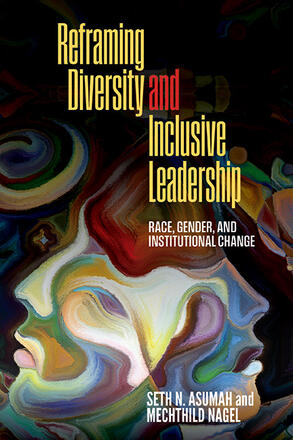
Reframing Diversity and Inclusive Leadership
Race, Gender, and Institutional Change
Alternative formats available from:
Shows how authentic diversity and inclusive leadership practices can promote anti-racist, equitable, and transformational change in institutions of higher learning in the United States and beyond.
Description
How can we tackle racism and sexism on our college and university campuses? What is the role of education leaders in advancing social justice? Reframing Diversity and Inclusive Leadership addresses the urgent need for more than merely performative gestures toward—and a redoubled, authentically engaged investment in—diversity, equity, and inclusion (DEI). Seth N. Asumah and Mechthild Nagel examine how traditional leadership models have tended to exacerbate racial and gender inequities in United States higher education and society at large. Using a cross-cultural, comparative approach indebted to critical race theory, critical whiteness studies, and Black feminism, Asumah and Nagel draw on decades of combined experience in the US and globally to provide a framework for inclusive leadership practices, actions, and policies. A valuable resource for administrators, faculty, students, and political and industry leaders, Reframing Diversity and Inclusive Leadership responds to calls for justice on campuses and beyond.
Seth N. Asumah is SUNY Distinguished Teaching Professor, Founding Chair and Professor of Africana Studies, and Professor of Political Science at the State University of New York at Cortland. As Founding Director of the Summer Institute for Diversity, Equity, Inclusion and Social Justice (SIDEISJ) at SUNY Cortland, Asumah co-facilitates DEI and inclusive leadership institutes with Nagel in the United States, Europe, and Africa. Mechthild Nagel is Professor of Philosophy and Affiliated Professor of Africana Studies. She is also Director of the Center for Ethics, Peace and Social Justice at SUNY Cortland. Together they have coedited Diversity, Social Justice, and Inclusive Excellence: Transdisciplinary and Global Perspectives, also published by SUNY Press.
Reviews
"As America and the rest of the world struggle with white supremacist and autocratic leaders, higher education should be in the forefront to present models of education to combat this trend. Asumah and Nagel offer a 'blueprint for change.' We must go beyond our comfort zone and our sense of 'us' and 'them' to dismantle systemic racism and embrace models of diversity that exemplify integrity, civility, ethics, civic virtue, dependability, and trustworthiness." — from the foreword by Elizabeth Davis-Russell